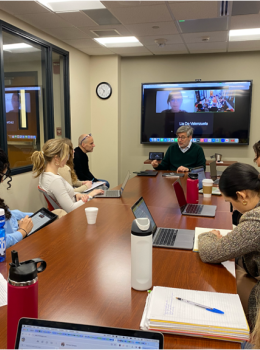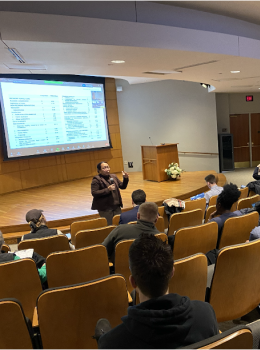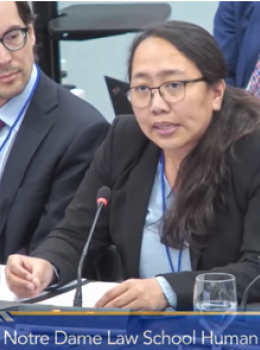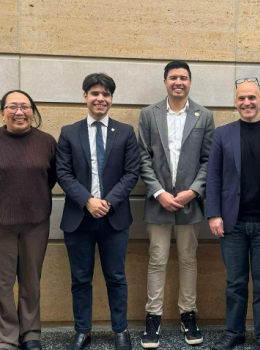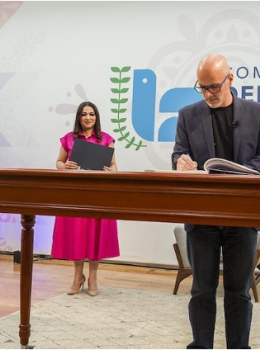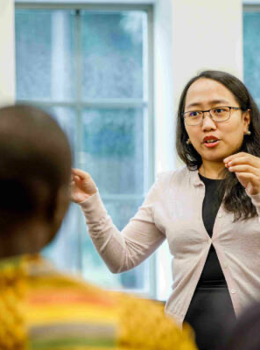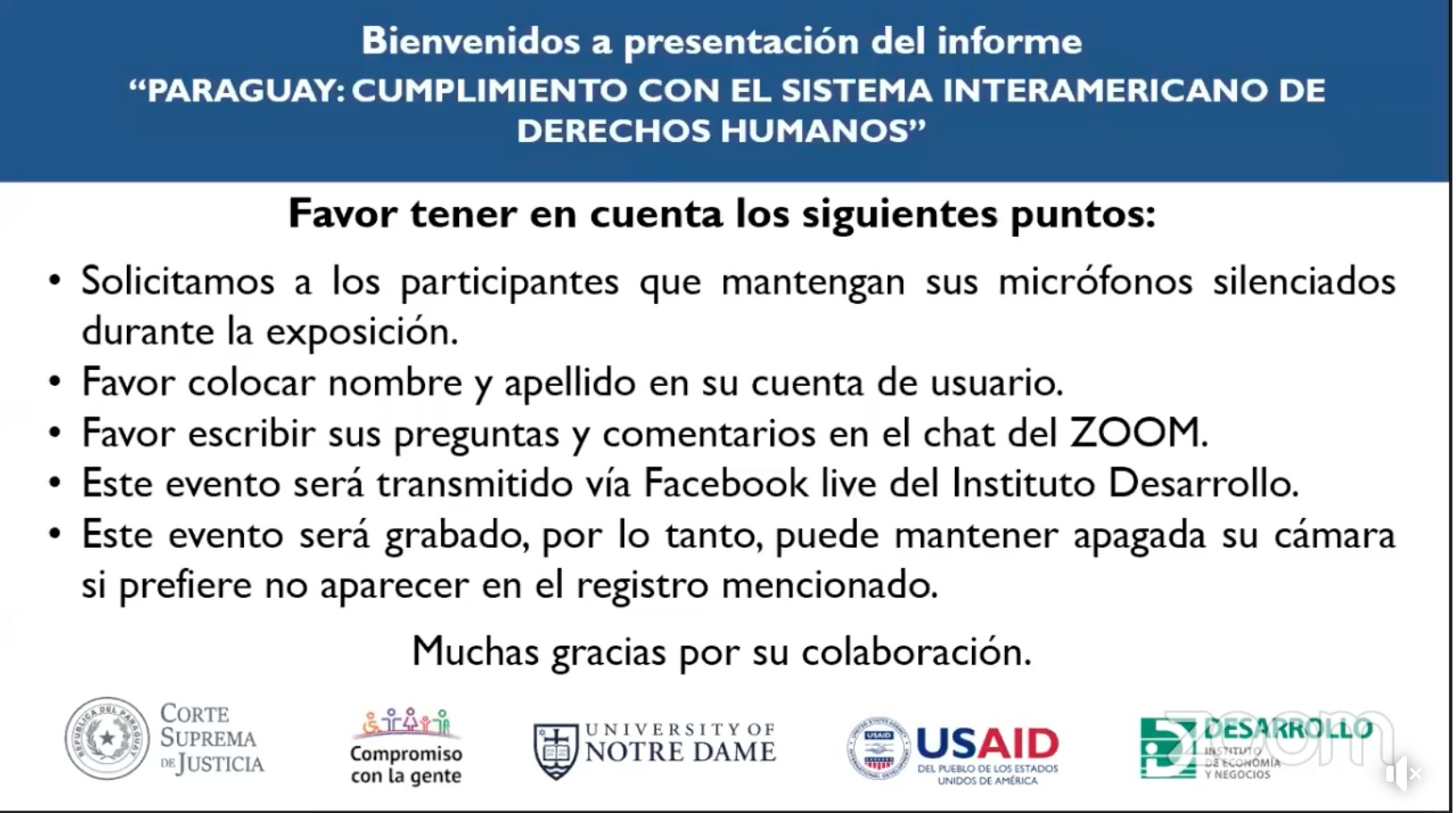EVENTS
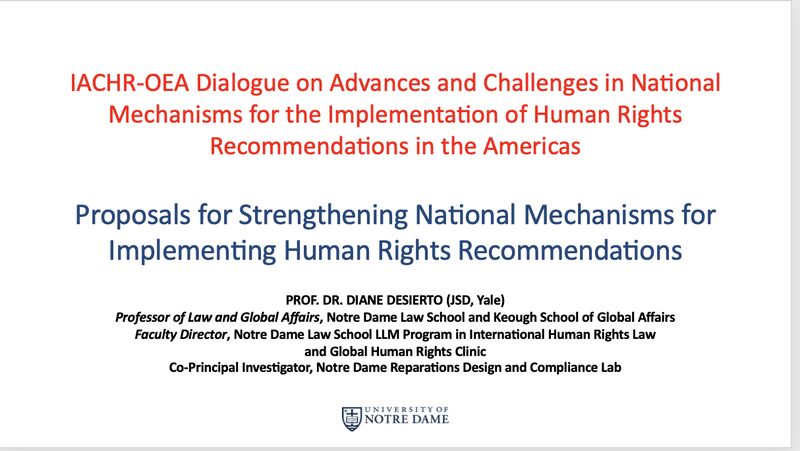
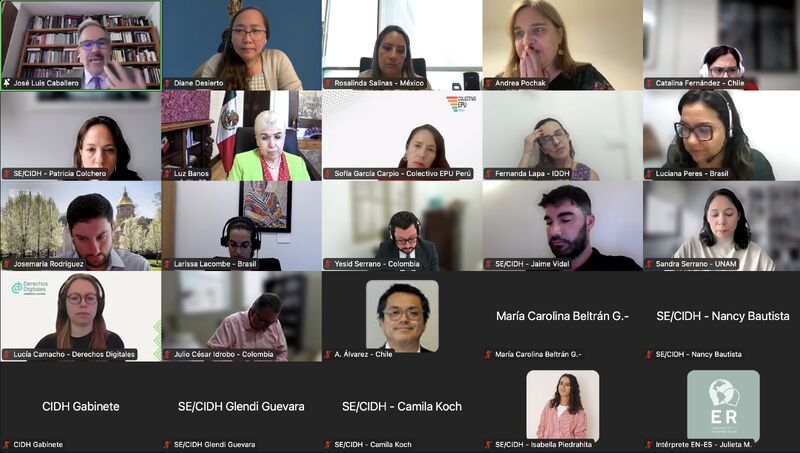
Inter-American Commission on Human Rights' Dialogue on Advances and Challenges in National Mechanisms for the Implementation of Human Rights Recommendations in the Americas.
July 9, 2025
PI Diane Desierto discussed academic contributions to strengthening such national mechanisms, especially on the conditions for effectiveness (e.g. engagement, coordination, consultation, and information management) and how the University of Notre Dame has supported all four through the work of the Notre Dame Reparations Design and Compliance Lab, the Notre Dame Law School Global Human Rights Clinic, and the Human Rights LLM Program of Notre Dame Law School.
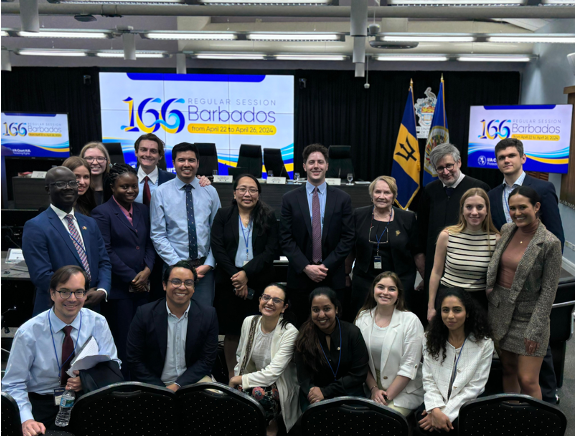
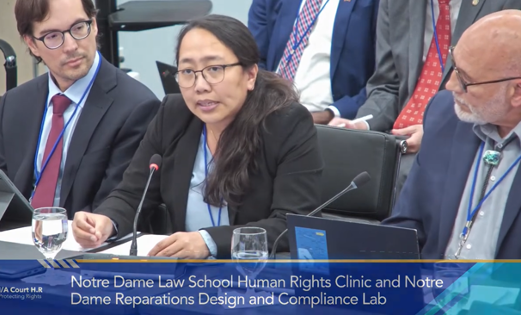
Notre Dame Law School Human Rights Clinic and the Notre Dame Reparations Design and Compliance Lab present oral Arguments Before the Inter-American Court of Human Rights in the Advisory Opinion of the Climate Emergency
April 23, 2024; Bridgetown, Barbados
A Notre Dame Law School Human Rights Clinic and Reparations Lab delegation presented oral arguments before the Inter-American Court of Human Rights Public Hearings on the Advisory Opinion of the Climate Emergency and Human Rights requested by the Republic of Colombia and the Republic of Chile.
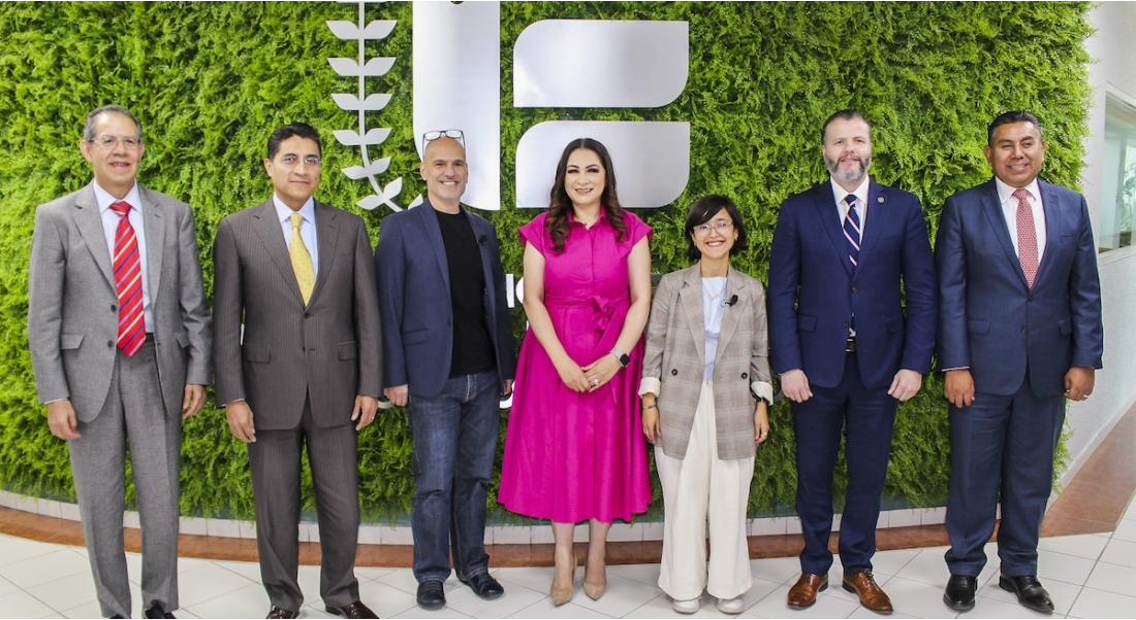
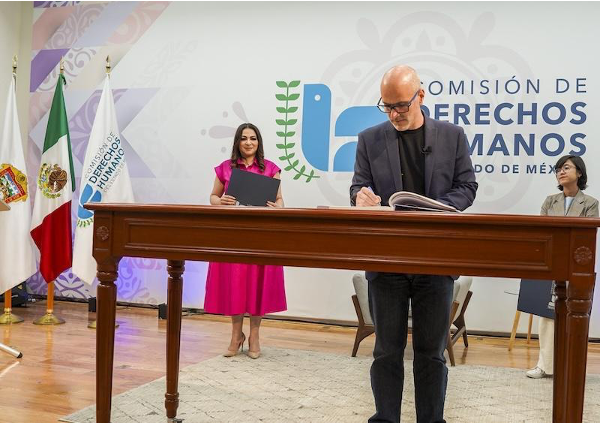
Kellogg’s Reparations Lab Partners with Commission of Human Rights in State of Mexico
October 23, 2023; Toluca, Mexico
PI Aníbal Pérez-Liñán and graduate student affiliate Mayra Ortiz Ocaña presented the analytic framework and preliminary data collection results for the Index to measure human rights project to an audience of authorities from the State of Mexico including Human Rights Commission President Myrna Araceli García Morón.
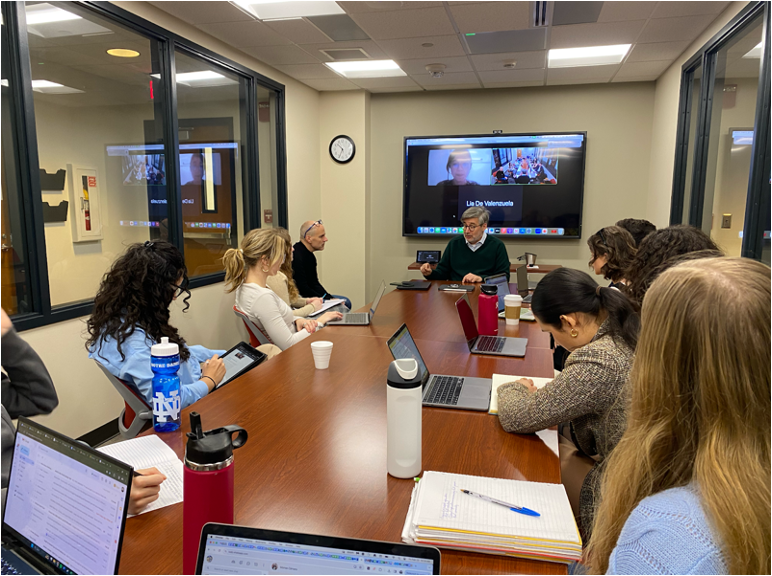
Reparations Lab meeting with Secretary of the Interamerican Court of Human Rights, Pablo Saavedra
March 1, 2024; Notre Dame, Indiana
Pablo Saavedra shared his experiences on reparations design and compliance at the Inter-American Court of Human Rights with graduate and undergraduate students affiliated to the Reparations Lab.
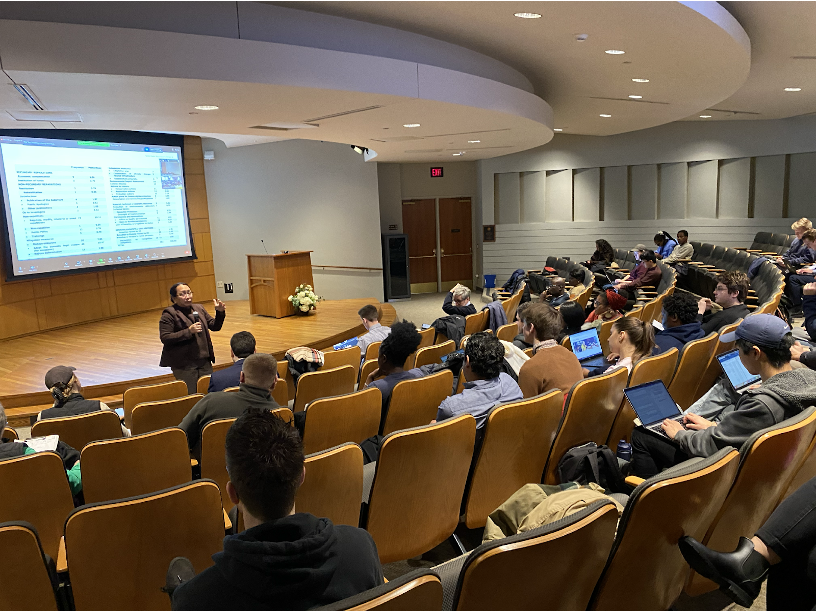
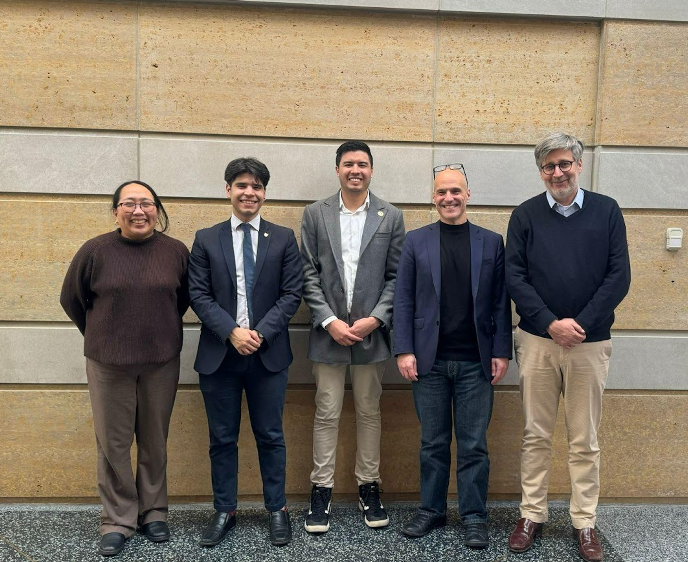
February 28, 2024; Notre Dame, Indiana
One-day interdisciplinary symposium, with the objective to convene experts, practitioners, policymakers, and scholars to explore reparations within the realms of human rights, climate change, and international development. This event aims to facilitate dialogue, share knowledge, and present three reparation datasets developed by the Notre Dame Design and Compliance Reparations Lab on Climate Change litigation, IACtHR’s judgements, and the World Bank Inspection Panel’s decisions.
Speakers:
- Diane Desierto: Director LLM and Global Human Rights Clinic, Notre Dame Law School
- Aníbal Pérez-Liñán: Director of the Kellogg Institute for International Studies
- Justice Pablo Saavedra: Secretary of the Inter-American Court of Human Rights
- Michael Gerrard: Professor of Practice and Founding Director, Sabin Center for Climate Change Law, Columbia Law School
- María Antonia Tigre: Director of Global Climate Change Litigation, Sabin Center for Climate Change Law, Columbia Law School
- Thalia Viveros: Senior Research Fellow, Max Planck Institute for Comparative Public Law and International Law
- Faisal Yamil Meneses: Kellogg Research Associate
- Nicolás Buitrago: JSD Candidate, Notre Dame Law School, Kellogg PhD Fellow
- Garrett Pacholl: Reparations Lab undergraduate student affiliate
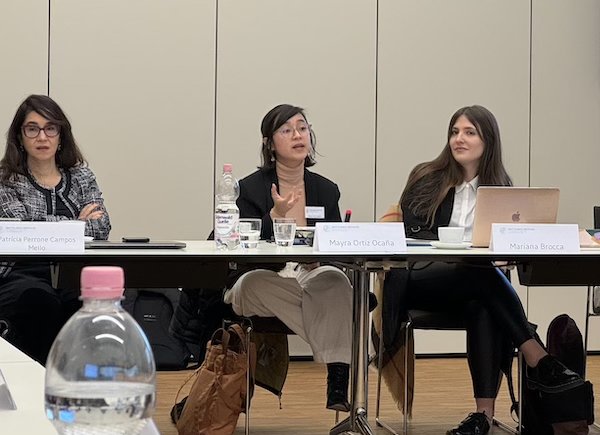
Inter-American Week. LXXV Anniversary of the DADH in light of Transformative Constitutionalism in Latin America: The Inter-American Human Rights System as a Successful Model. Max Planck Institute for Comparative Public Law and International Law
December 4-8, 2023; Heidelberg, Germany
Reparations Lab doctoral researchers Nicolás Buitrago-Rey (J.S.D. in International Human Rights Law) and Mayra Ortiz Ocaña (PhD. in Political Science) presented research projects and publications of the Reparations Lab related to the Inter-American System of Human Rights.
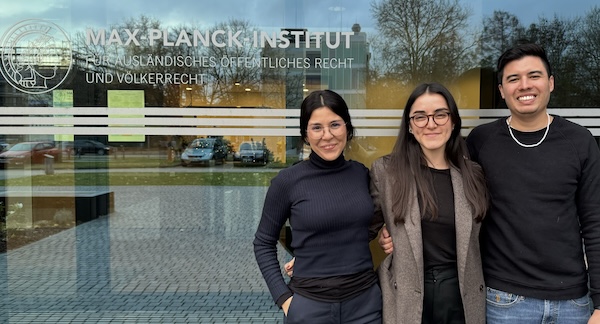
Max Planck Institute for Comparative Public Law and International Law Project Incubator “Communities of Practice”
November 29-December 1, 2023; Heidelberg, Germany
Nicolás Buitrago-Rey (Kellogg Institute), Angélica Suárez Torres (IACtHR), and Paloma Nuñez Fernández (IACtHR) presented the Inter-American Court of Human Rights qualitative database to scholars, members of civil organizations and the Inter-American System of Human Rights.
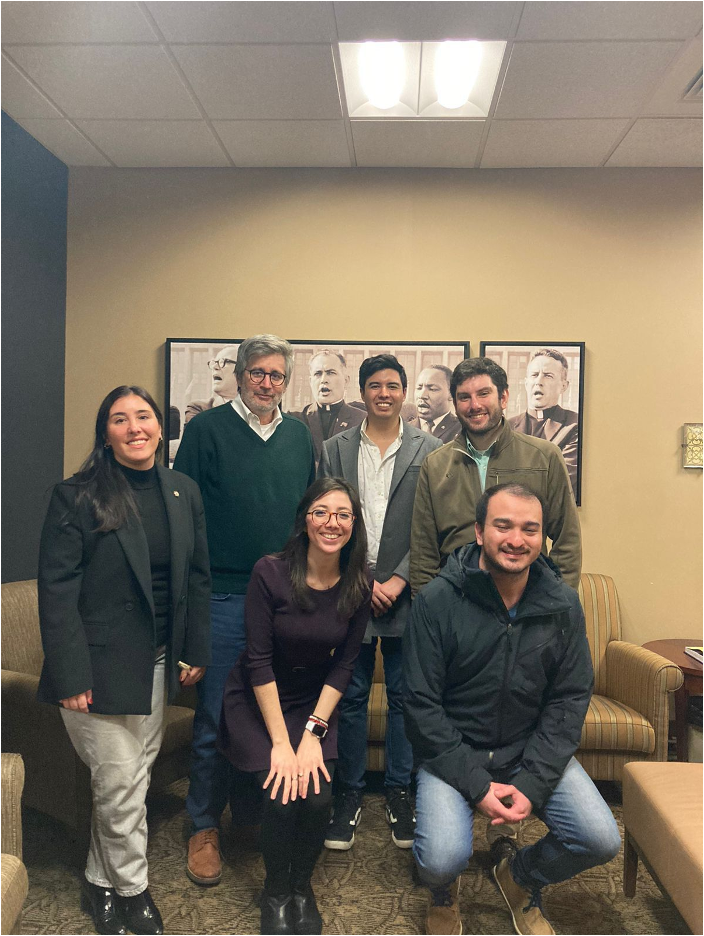
Reparations Lab Human Rights LLM’s meeting with Pablo Saavedra, Secretary of the Inter-American Court of Human Rights
April, 2023. Notre Dame, Indiana
The LL.M in International Human Rights Law Students of the Notre Dame Reparations Design and Compliance Lab Caren Kalafatich (LL.M. 23), Josemaría Rodríguez Conca (LL.M. 23), Carlos Humberto Martínez Roca (LL.M. 23) and Monserrat Cámara Santos (LL.M. 23) had the opportunity to discuss with Pablo Saavedra, Secretariat of the Corte Interamericana de Derechos Humanos Corte IDH about the challenges and the role of the Court at the Inter-American System.
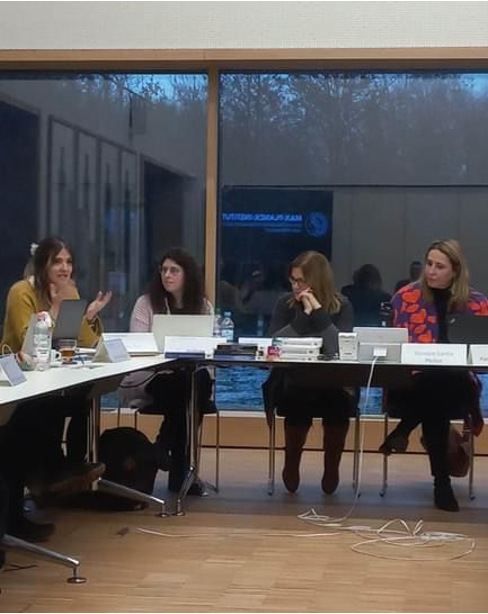
Winter School “Communities of Practice”. Max Planck Institute for Comparative Public Law and International Law
December 1, 2022; Heidelberg, Germany
Mariana Brocca and Nicolás Buitrago-Rey- presented the Reparations Lab papers on the Inter-American Commission on Human Rights and the Inter-American Court in the Winter School of Human Rights and Communities of Practice of the MPIL.
Inter-American Coloquium. Max Planck Institute for Comparative Public Law and International Law
November 16, 2022; Heidelberg, Germany
Nicolás Buitrago-Rey presented the Research on the Inter-American Court in the Inter-American Week of the MPIL.
Max Planck Institute for Comparative Public Law and International IX Seminar on “Transformative Impact of the Inter-American Human Rights System”
July 7-9, 2022. Heidelberg, Germany
Aníbal Pérez Liñán (Director and PI of the Reparations Lab), Nicolás Buitrago Rey (LL.M. 22, Kellogg Institute Research Associate, and Angélica Suárez Torres (LL.M.22.IACtHR) presented the finding on Specificity at the Guarantees of Non-Repetition at the Inter-American Court of Human Rights.
The Inter-American Human Rights System: Best Practices for Implementing IACHR Decisions (HYBRID)
Tuesday, December 7, 2021 - 6:00pm EDT
Note: This event recording is in Spanish.
The Inter-American Human Rights system continues to play an important role in protecting human rights. Its Inter-American Commission and Inter-American Court are making innovative efforts to document the impact of their decisions and to monitor compliance across the region. Participants in this session discussed the Observatory of Impact, a novel platform created by the Inter-American Commission on Human Rights to monitor the impact of its recommendations in collaboration with strategic actors, scholars, and communities. This event was presented in 2021 by the Keough School of Global Affairs and its Kellogg Institute for International Studies and Klau Center for Civil and Human Rights, by the Notre Dame Reparations Design and Compliance Lab, by the Inter-American Commission on Human Rights, and by the Max Planck Institute for Comparative Public Law and International Law.
The Inter-American Human Rights System: Reparations Design and Compliance (HYBRID)
Wednesday, December 8, 2021 - 6:00pm EDT
This event features the Notre Dame Reparations Design and Compliance Lab, the Inter-American Commission on Human Rights, and the Max Planck Institute for Comparative Public Law and International Law. It focuses on the significant role of the inter-American human rights system in safeguarding human rights, with insights from top professionals in international human rights organizations, academia, and international think tanks. Key speakers include Diane A. Desierto, Professor of Law and Global Affairs at the University of Notre Dame; Aníbal Pérez-Liñán, Professor of Political Science and Global Affairs at the University of Notre Dame; and Olúfẹ́mi O. Táíwò, Assistant Professor of Philosophy at Georgetown University. The series aims to explore how the methodologies, research findings, and ongoing projects of the Notre Dame Reparations Design and Compliance Lab can enhance policy-making in human rights.
The Inter-American Human Rights System: Launch of Principles on Academic Freedom (HYBRID)
Thursday, December 9, 2021 - 6:00pm EDT
The inter-American human rights system continues to play an important role in protecting human rights. One emerging area of focus for its Commission is the growing number of challenges to academic freedom in the Americas. This Panel analyzes: (i) how should human rights bodies and policymakers deal with these challenges?, (ii) what would a helpful response look like?
Friday, December 10, 2021 - 9:00am
Presentation of the results of a research study conducted under the Rule of Law and Culture of Integrity program sponsored by the Instituto Desarrollo and the University of Notre Dame. The Reparations Lab of the University of Notre Dame collaborated with the Human Rights Directorate of the CSJ to carry out this study. The project focuses on analyzing the claims filed before the Inter-American Human Rights System in which Paraguay must comply with reparations measures. By evaluating the time it takes for the State to comply with these measures, the study compares compliance times for different types of instruments and claims.
The Structural Impact of the Inter-American Court of Human Rights in the Americas
Thursday, October 29, 2020, 4:00pm EDT
In this event, organized by the Notre Dame Reparations Design and Compliance Policy and Practice Lab and the Klau Center for Civil and Human Rights, Pablo Saavedra, Executive Secretary of the Inter-American Court of Human Rights and Aníbal Pérez-Liñán, Professor of Political Science and Global Affairs at the University of Notre Dame, talked about the positive impacts of the Inter-American Court decisions on legislation, public policy, and institutions in Latin American countries. They argue that, since its creation more than 40 years ago, the Inter-American Court of Human Rights has become increasingly crucial to the legal developments and to strengthening the rule of law in the Americas. They discussed specific examples in which the Court’s decisions have had a transformative impact on the region and have triggered deep-running structural changes in various countries.
Workshop: Rethinking Compliance and Reparations in International Law (VIRTUAL)
Monday, May 25, 2020, 10:30am - 12:30pm EDT
During this virtual workshop, the Notre Dame Reparations Lab (NDRL), in collaboration with scholars and professionals, presents the development of a shared methodology for studying and analyzing compliance with reparative measures issued by international adjudication bodies. This methodology aims to investigate whether reparative measures are being adhered to, the timing of such compliance, and the duration within which it occurs. The methodological framework discussed in this workshop enables a diverse range of analytical approaches.






